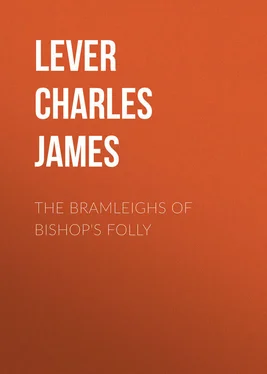Charles Lever - The Bramleighs of Bishop's Folly
Здесь есть возможность читать онлайн «Charles Lever - The Bramleighs of Bishop's Folly» — ознакомительный отрывок электронной книги совершенно бесплатно, а после прочтения отрывка купить полную версию. В некоторых случаях можно слушать аудио, скачать через торрент в формате fb2 и присутствует краткое содержание. Издательство: Иностранный паблик, Жанр: literature_19, foreign_antique, foreign_prose, на английском языке. Описание произведения, (предисловие) а так же отзывы посетителей доступны на портале библиотеки ЛибКат.
- Название:The Bramleighs of Bishop's Folly
- Автор:
- Издательство:Иностранный паблик
- Жанр:
- Год:неизвестен
- ISBN:нет данных
- Рейтинг книги:4 / 5. Голосов: 1
-
Избранное:Добавить в избранное
- Отзывы:
-
Ваша оценка:
- 80
- 1
- 2
- 3
- 4
- 5
The Bramleighs of Bishop's Folly: краткое содержание, описание и аннотация
Предлагаем к чтению аннотацию, описание, краткое содержание или предисловие (зависит от того, что написал сам автор книги «The Bramleighs of Bishop's Folly»). Если вы не нашли необходимую информацию о книге — напишите в комментариях, мы постараемся отыскать её.
The Bramleighs of Bishop's Folly — читать онлайн ознакомительный отрывок
Ниже представлен текст книги, разбитый по страницам. Система сохранения места последней прочитанной страницы, позволяет с удобством читать онлайн бесплатно книгу «The Bramleighs of Bishop's Folly», без необходимости каждый раз заново искать на чём Вы остановились. Поставьте закладку, и сможете в любой момент перейти на страницу, на которой закончили чтение.
Интервал:
Закладка:
Charles James Lever
The Bramleighs of Bishop's Folly
CHAPTER I. THE BISHOP’S FOLLY
Towards the close of the last century there was a very remarkable man, Bishop of Down, in Ireland: a Liberal in politics, in an age when Liberalism lay close on the confines of disloyalty; splendidly hospitable, at a period when hospitality verged on utter recklessness; he carried all his opinions to extremes. He had great taste, which had been cultivated by foreign travel, and having an ample fortune, was able to indulge in many whims and caprices, by which some were led to doubt of his sanity; but others, who judged him better, ascribed them to the self-indulgence of a man out of harmony with his time, and comtemptuously indifferent to what the world might say of him.
He had passed many years in Italy, and had formed a great attachment to that country. He liked the people and their mode of life; he liked the old cities, so rich in art treasures and so teeming with associations of a picturesque past; and he especially liked their villa architecture, which seemed so essentially suited to a grand and costly style of living. The great reception-rooms, spacious and lofty; the ample antechambers, made for crowds of attendants; and the stairs wide enough for even equipages to ascend them. No more striking illustration of his capricious turn of mind need be given than the fact that it was his pleasure to build one of these magnificent edifices in an Irish county! – a costly whim, obliging him to bring over from Italy a whole troop of stucco-men and painters, men skilled in fresco-work and carving, – an extravagance on which he spent thousands. Nor did he live to witness the completion of his splendid mansion.
After his death the building gradually fell into decay. His heirs, not improbably, little caring for a project which had ingulfed so large a share of their fortune, made no efforts to arrest the destroying influences of time and climate, and “Bishop’s Folly” – for such was the name given to it by the country people – soon became a ruin. In some places the roof had fallen in, the doors and windows had all been carried away by the peasants, and in many a cabin or humble shealing in the county around slabs of colored marble or fragments of costly carving might be met with, over which the skill of a cunning workman had been bestowed for days long. The mansion stood on the side of a mountain which sloped gradually to the sea. The demesne, well wooded, but with young timber, was beautifully varied in surface, one deep glen running, as it were, from the very base of the house to the beach, and showing glimpses, through the trees, of a bright and rapid river tumbling onward to the sea. Seen in its dilapidation and decay, the aspect of the place was dreary and depressing, and led many to wonder how the bishop could ever have selected such a spot; for it was not only placed in the midst of a wild mountain region, but many miles away from anything that could be called a neighborhood. But the same haughty defiance he gave the world in other things urged him here to show that he cared little for the judgments which might be passed upon him, or even for the circumstances which would have influenced other men. “When it is my pleasure to receive company, I shall have my house full no matter where I live,” was his haughty speech, and certainly the whole character of his life went to confirm his words.
Some question of disputed title, after the bishop’s death, threw the estate into Chancery, and so it remained till, by the operation of the new law touching incumbered property, it became marketable, and was purchased by a rich London banker, who had declared his intention of coming to live upon it.
That any one rich enough to buy such a property, able to restore such a costly house, and maintain a style of living proportionate to its pretensions, should come to reside in the solitude and obscurity of an Irish county, seemed all but impossible; and when the matter became assured by the visit of a well-known architect, and afterwards by the arrival of a troop of workmen, the puzzle then became to guess how it chanced that the great head of a rich banking firm, the chairman of this, the director of that, the promoter of Heaven knows what scores of industrial schemes for fortune, should withdraw from the great bustle of life to accept an existence of complete oblivion.
In the little village of Portshandon – which straggled along the beach, and where, with a few exceptions, none but fishermen and their families lived – this question was hotly debated; an old half-pay lieutenant, who by courtesy was called Captain, being at the head of those who first denied the possibility of the Bramleighs coming at all, and when that matter was removed beyond a doubt, next taking his stand on the fact that nothing short of some disaster in fortune, or some aspersion on character, could ever have driven a man out of the great world to finish his days in the exile of Ireland.
“I suppose you’ll give in at last, Captain Craufurd,” said Mrs. Bayley, the postmistress of Portshandon, as she pointed to a pile of letters and newspapers all addressed to “Castello,” and which more than quadrupled the other correspondence of the locality.
“I did n’t pretend they were not coming, Mrs. Bayley,” said he, in the cracked and cantankerous tone he invariably spoke in. “I simply observed that I ‘d be thankful for any one telling me why they were coming. That’s the puzzle, – why they ‘re coming?”
“I suppose because they like it, and they can afford it,” said she, with a toss of her head.
“Like it!” cried he, in derision. “Like it! Look out of the window there beside you, Mrs. Bayley, and say, is n’t it a lovely prospect, that beggarly village, and the old rotten boats, keel uppermost, with the dead fish and the oyster-shells, and the torn nets, and the dirty children? Is n’t it an elegant sight after Hyde Park and the Queen’s palace?”
“I never saw the Queen’s palace nor the other place you talk of, but I think there’s worse towns to live in than Portshandon.”
“And do they think they’ll make it better by calling it Castello?” said he, as with a contemptuous gesture he threw from him one of the newspapers with this address. “If they want to think they ‘re in Italy they ought to come down here in November with the Channel fogs sweeping up through the mountains, and the wind beating the rain against the windows. I hope they’ll think they’re in Naples. Why can’t they call the place by the name we all know it by? It was Bishop’s Folly when I was a boy, and it will be Bishop’s Folly after I ‘m dead.”
“I suppose people can call their house whatever they like? Nobody objects to your calling your place Craufurd’s Lea.”
“I’d like to see them object to it,” cried he, fiercely. “It’s Craufurd’s Lea in Digge’s ‘Survey of Down,’ 1714. It’s Craufurd’s Lea in the ‘Anthologia Hibernica,’ and it’s down, too, in Joyce’s ‘Irish Fisheries;’ and we were Craufurds of Craufurd’s Lea before one stone of that big barrack up there was laid, and maybe we ‘ll be so after it’s a ruin again.”
“I hope it’s not going to be a ruin any more, Captain Craufurd, all the same,” said the postmistress, tartly, for she was not disposed to undervalue the increased importance the neighborhood was about to derive from the rich family coming to live in it.
“Well, there’s one thing I can tell you, Mrs. Bayley,” said he, with his usual grin. “The devil a bit of Ireland they ‘d ever come to, if they could live in England. Mind my words, and see if they ‘ll not come true. It’s either the bank is in a bad way, or this or that company is going to smash, or it’s his wife has run away, or one of the daughters married the footman; – something or other has happened, you ‘ll see, or we would never have the honor of their distinguished company down here.”
Читать дальшеИнтервал:
Закладка:
Похожие книги на «The Bramleighs of Bishop's Folly»
Представляем Вашему вниманию похожие книги на «The Bramleighs of Bishop's Folly» списком для выбора. Мы отобрали схожую по названию и смыслу литературу в надежде предоставить читателям больше вариантов отыскать новые, интересные, ещё непрочитанные произведения.
Обсуждение, отзывы о книге «The Bramleighs of Bishop's Folly» и просто собственные мнения читателей. Оставьте ваши комментарии, напишите, что Вы думаете о произведении, его смысле или главных героях. Укажите что конкретно понравилось, а что нет, и почему Вы так считаете.












